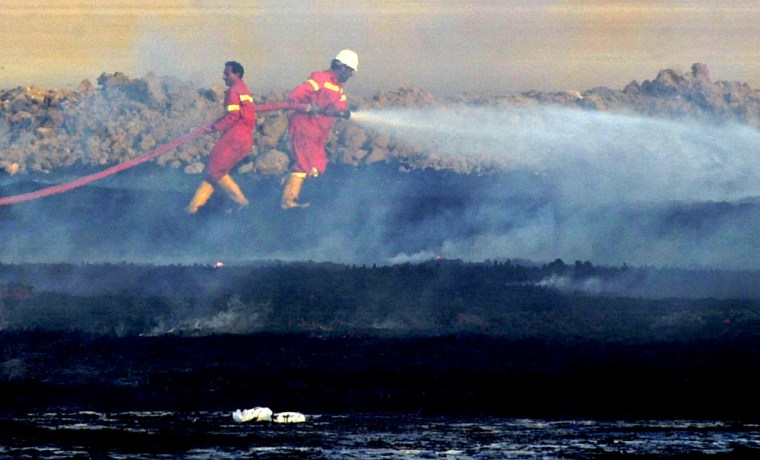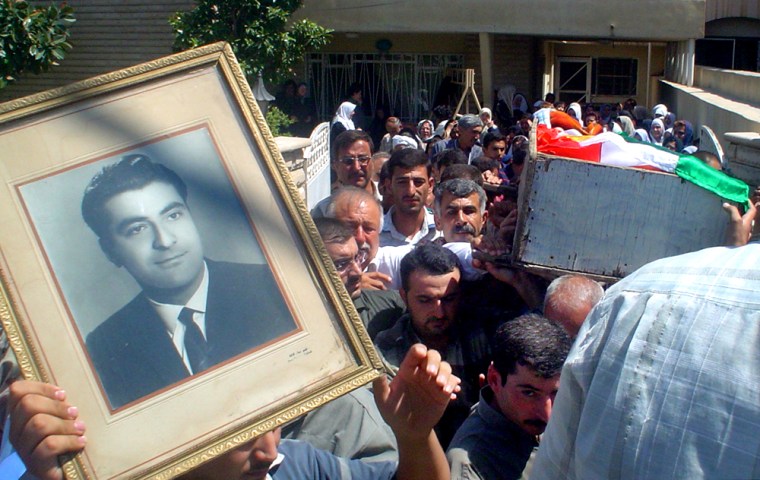Saboteurs blasted a key pipeline Wednesday for the second time in as many days, halting all oil exports from Iraq, officials said. Separately, gunmen killed the top security official of the state-run Northern Oil company as insurgents stepped up attacks on Iraq's infrastructure.
Elsewhere, an Iraqi police officer was killed and five Iraqi civilians were wounded when a roadside bomb exploded in the center of Ramadi early Wednesday morning as an American convoy drove by, hospital and military officials said.
Minutes after the blast U.S. Marines arrested seven Iraqis, including six members of the Iraqi Civil Defense Corps for alleged involvement in the attack, military officials said. There were no U.S. military causalities.
The arrest of the civil defense force members raises further questions about the capability of Iraqi security forces to maintain order in the country after the transfer of sovereignty June 30.
The ICDC is supposed to be the key to ensuring domestic security in this country as the Americans lower their security profile after sovereignty is transferred.
The explosion occurred at 8.45 am when a fuel drum exploded, spraying burning fuel and oil on several nearby cars, the officials said.
U.S. Marines secured the scene as Iraqi police recovered a charred body from one of two vehicles destroyed in the blast. Associated Press Television News footage showed a sport utility vehicle and a sedan smoldering as ambulances whizzed by.
It was unclear from which vehicle the body was retrieved.
Oil exports halted
Meanwhile, the Wednesday attack north of the town of Faw crippled two already damaged pipelines, forcing a halt in all Iraqi oil exports southward through the Gulf, Southern Oil Company spokesman Samir Jassim said.
"Due to the damage inflicted on the two pipelines, the pumping of oil to the Basra oil terminal has completely stopped," Jassim said. "Exports have come to halt."

Exports were halted last month through the other avenue -- the northern pipeline from Kirkuk to Ceyhan, Turkey, after a May 25 bombing, Turkish officials said on condition of anonymity.
Two explosions on the southern pipeline occurred in the same area as a blast Tuesday. It could take up to a week to repair the damage, Jassim said.
Another pipeline carrying oil to a domestic refinery was attacked Tuesday night near Dibis, some 20 miles west of Kirkuk, according to Mustafa Awad, an official in the Northern Oil Company.
That pipeline does not carry crude oil for export, however. The fire was extinguished.
Security officer killed
The security officer for the Northern Oil Company was killed in an ambush Wednesday in a crowded public market in Kirkuk. The victim, Ghazi Talabani, was a relative of the leader of one of Iraq's main Kurdish parties, Jalal Talabani.
Reviving petroleum exports is the key to restoring Iraq's economy after decades of war, international sanctions and Saddam Hussein's tyranny. However, repeated attacks have slowed the process of returning Iraq, with the world's second largest petroleum reserves after Saudi Arabia, to the forefront of global energy markets.
Insurgents are targeting the infrastructure apparently to undermine confidence in the new government, which takes power June 30. On Monday, a car bomb killed 13 people in Baghdad, including three foreign engineers working to restore the electricity sector.
Brig. Gen. Mark Kimmitt, the coalition deputy operations chief, said another convoy of contractors was ambushed Tuesday in Baghdad. Two people were killed and three were injured when shots were fired from a highway overpass, the U.S. military said Wednesday.
Iraqi police role
Meanwhile, new allegations surfaced about the professionalism of the Iraqi police, who are due to assume greater responsibility for security after the formal end of the occupation June 30.
On Tuesday, dozens of Iraqi Shiites complained that Shiite truck drivers who had sought refuge in a police station in the Sunni town of Fallujah were instead handed over to extremists, who killed them after they were unable to pay a ransom. Six bodies were found Monday in a morgue in Ramadi, also a Sunni town.
At a protest rally, a 12-year-old boy, Mohammed Khudeir, said he was among those allegedly handed over by the police to a hardline cleric. But the cleric and his followers let him go, apparently because of his age.
"We tried to seek police protection, but the policemen handed us over," Mohammed said. He said the cleric "handed us over to a group of Arabs who spoke with non-Iraqi accents. I was tortured for a while, but then I was released."
Mohammed said the insurgents killed his brother and uncle.
One man, Alaa Mery, said that on June 8, he went to Fallujah to negotiate for the hostages' release. He said he met with some Syrians who identified themselves as members of the extremist Wahhabist sect and said they were holding the drivers because they collaborated with the Americans.
The Syrians demanded the money, which the families could not pay, he said.
"Fallujah clerics and people made a big fuss regarding Abu Ghraib torture, but now they are killing and mutilating Muslims," Mery said, referring to the American abuse of Iraqis at the Abu Ghraib prison. "They are not resistance. They are a copy of Saddam.
